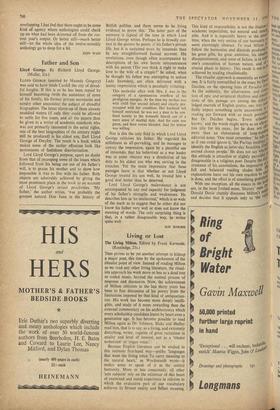Father and Son
Lloyd George. By Richard Lloyd George. (Muller, 21s.) LLOYD GEORGE (assisted by Maundy Gregory) was said to have made Cardiff the city of dread- ful knights. If this is so he has been repaid by himself becoming (with the assistance of some of his family, his former private secretaries and sundry other associates) the subject of dreadful biographies. The latest stirrer-up of these already muddied waters (if only they could be allowed to settle for five years, and all the papers then be given to a writer of academic standards who was not primarily interested in the serial rights, one of the best biographies of the century might still be produced) is his eldest son, Earl Lloyd George of Dwyfor. The result is a book which makes some of the earlier effusions look like monuments of fastidious discrimination.
Lord Lloyd George's purpose, apart no doubt from that of recouping some of the losses which followed from his being cut out of his father's will, is to praise his mother and to show how impossible it was to live with his father. Both objects are admirably achieved by giving the most prominent place in the book to an account of Lloyd George's sexual proclivities. 'My father,' the author writes, 'was probably the greatest natural Don Juan in the history of British politics. and there seems to be living evidence to prove this.' The latter part of the sentence is typical of the tone in which Lord Lloyd George writes. Perhaps he is broadly cor- rect in the picture he paints of his father's private life, but it is sustained more by innuendo than by any straightforward factual account. His revelations, even though often accompanied by descriptions of his own heroic remonstrances with his parent (`Do you think it right to make love to the wife of a cripple?' he asked, when he thought his father was attempting to seduce Lady Snowden), are often delivered with a jaunty imprecision which is peculiarly irritating:
This particular affair with Mrs. J. was in the
category of a spontaneous overflow of his prodigious energies. At the time my mother was with child (her second infant) and clearly pre- occupied with her condition. Her husband felt himself restricted; he was not a man to be con- fined tamely to the domestic hearth out of a mere sense of marital duty. And the corn was green, and their voices blended. And the widow was willing.
Nor is this the only field in which Lord Lloyd George criticises his father. He regarded his selfishness as all-pervading, and he manages to convey the impression, again by a plentiful use of innuendo, that his behaviour as a war leader was in some obscure way a dereliction of his duty to his eldest son who was serving in the trenches. Yet the main impression that these passages leave is that whether or not Lloyd George treated his son well, he treated him a good deal better than he deserved.
Lord Lloyd George's malevolence is not accompanied by any real capacity for judgment of his father's strengths and weaknesses. He describes him as 'an intellectual,' which is so wide of the mark as to suggest that he either did not know his father very well or does not know the meaning of words. The only surprising thing is that, in a rather disagreeable way, he writes quite well.
ROY JENKINS














































 Previous page
Previous page